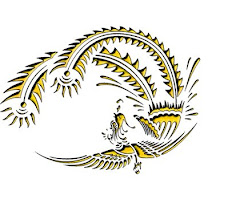
The Nature of Conflict can be described by using this Chinese symbol. It shows both danger and opportunity. Conflict contains both; Mediation offers solutions.
This symbol is the Chinese word for "crisis". It is a combination of two characters. The top stands for "danger" and the bottom represents "opportunity".
Conflict contains both of these elements. Too often our focus is on the danger and we fail to appreciate the opportunity which is present as well.
This symbol is the Chinese word for "crisis". It is a combination of two characters. The top stands for "danger" and the bottom represents "opportunity".
Conflict contains both of these elements. Too often our focus is on the danger and we fail to appreciate the opportunity which is present as well.
Taken from http://tinyurl.com/cyr4br
Obama recently referenced in one of his motivational speeches the Chinese symbol of, "crisis" which has been cited to translate into the meaning, "opportunity". He was referring to this symbol perhaps to give hope to our uncertain economic times.
This theory and translation of this symbol has been cited among many motivational speakers and the symbols can be purchased on-line in art form for empowerment. But is the translation accurate? Does the Chinese symbol of "crisis" also mean, "opportunity"? Or is this just positive thinking in our interpretation of this symbol? Are we naive to think that we can benefit or even profit from a crisis situation? Think about all of those investors who claim, "now is the time to buy" when the stocks or real estate is lower than previous times. Are they right? Should we listen and take action?In working with children for over ten years, it was often cited and believed that in a moment of crisis with a child (especially behavioral issues or traumatized children) a moment of crisis provides the ideal learning situation and opportunity for change. To be with the child in that moment to process their crisis allows them an opportunity to work through their faulty cognition or behavioral responses and learn new tools for coping and dealing with stress or conflict. The belief is that in the next moment of crisis their memories will trigger them to refer to the previous conflict moment and thereby make "better choices". There may be others who would argue that intervening in a moment of crisis will only add more fuel to the fire and make the situation worse. Two sides of the coin...which one are you calling out?
I've researched the Chinese symbol and what I found is that not everyone agrees that this symbol has been translated correctly. Instead of the symbol referring to, "opportunity", they believe it refers to, "incipient moment" or "crucial time". In addition, they believe that crisis is not the moment to "prosper oneself" but rather it is the time to "save one's neck". See http://tinyurl.com/b83va5 for this fascinating flip of the coin insight.
What is the real meaning of this Chinese symbol? Have we misinterpreted it? Many argue that the symbol, which is actually two symbols means danger+opportunity for action= crisis. Is it safe to say that in a crisis situation it is more important that the appropriate action is taken in the crucial time or incipient moment thereby solving the crisis and lending to a new opportunity? Wasn't it John Lennon who said, "there are no problems, only solutions?" thereby encouraging action and focusing on the present moment?
Or is it best to resort to "fear" mentality and try to "save one's neck" in attempts to take the appropriate action at the crucial time? This seems to hint to past thinking and "scarcity mode" and doesn't offer much promise in the moment and power of "now" but rather seems to suggest that things are outside and beyond our control. Is that how you choose to live your life?
I would argue that fear is not the answer. Fear is the other side of the coin thereby not solving the problem but rather contributing to it. Read the article included and let me know your thoughts. What is your interpretation of this symbol? But more importantly, how do you choose to act today assuming that even "inaction" is in fact, "action" in itself? Are you saving your dollars or investing in the unknown possible opportunity and the hope for a better tomorrow?







No comments:
Post a Comment